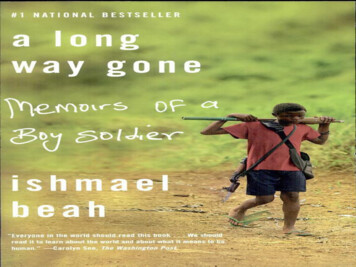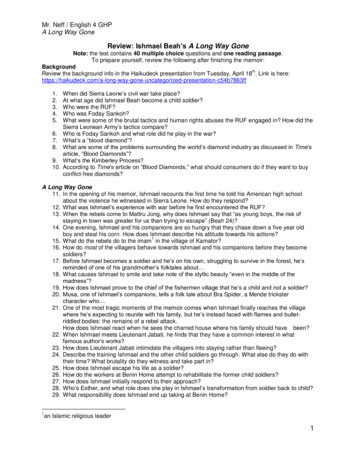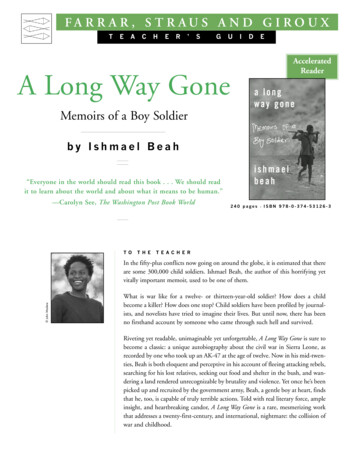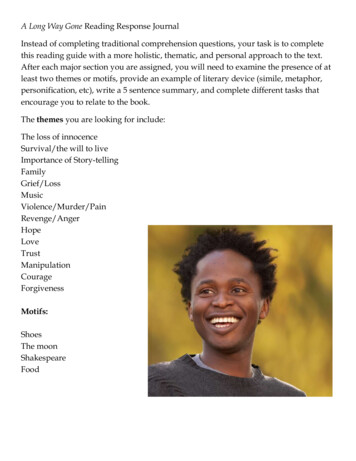
Transcription
1
2
CONTENTSGoneHunger: A Gone NovelLies: A Gone NovelPlague: A Gone NovelFear: A Gone NovelLight: A Gone NovelExcerpt from Messenger of FearAbout the AuthorAbout the Publisher3
4
5
MAPS6
7
8
DEDICATIONFor Katherine, Jake, and Julia9
CONTENTSMapsDedicationOne: 299 HOURS, 54 MINUTESTwo: 298 HOURS, 38 MINUTESThree: 298 HOURS, 05 MINUTESFour: 297 HOURS, 40 MINUTESFive: 291 HOURS, 07 MINUTESSix: 290 HOURS, 07 MINUTESSeven: 289 HOURS, 45 MINUTESEight: 287 HOURS, 27 MINUTESNine: 277 HOURS, 06 MINUTESTen: 274 HOURS, 27 MINUTESEleven: 273 HOURS, 39 MINUTESTwelve: 272 HOURS, 47 MINUTESThirteen: 258 HOURS, 59 MINUTESFourteen: 255 HOURS, 42 MINUTESFifteen: 251 HOURS, 32 MINUTESSixteen: 171 HOURS, 12 MINUTESSeventeen: 169 HOURS, 18 MINUTESEighteen: 164 HOURS, 32 MINUTESNineteen: 132 HOURS, 46 MINUTESTwenty: 131 HOURS, 03 MINUTESTwenty-One: 129 HOURS, 34 MINUTESTwenty-Two: 128 HOURS, 32 MINUTESTwenty-Three: 128 HOURS, 22 MINUTESTwenty-Four: 127 HOURS, 45 MINUTESTwenty-Five: 127 HOURS, 42 MINUTESTwenty-Six: 126 HOURS, 10 MINUTESTwenty-Seven: 125 HOURS, 57 MINUTESTwenty-Eight: 123 HOURS, 52 MINUTES10
Twenty-Nine: 113 HOURS, 33 MINUTESThirty: 108 HOURS, 12 MINUTESThirty-One: 100 HOURS, 13 MINUTESThirty-Two: 97 HOURS, 43 MINUTESThirty-Three: 88 HOURS, 24 MINUTESThirty-Four: 87 HOURS, 46 MINUTESThirty-Five: 86 HOURS, 11 MINUTESThirty-Six: 84 HOURS, 41 MINUTESThirty-Seven: 79 HOURS, 00 MINUTESThirty-Eight: 74 HOURS, 10 MINUTESThirty-Nine: 36 HOURS, 37 MINUTESForty: 26 HOURS, 47 MINUTESForty-One: 03 HOURS, 15 MINUTESForty-Two: 02 HOURS, 23 MINUTESForty-Three: 02 HOURS, 22 MINUTESForty-Four: 01 HOURS, 06 MINUTESForty-Five: 14 MINUTESForty-Six: 01 MINUTESFinalPraiseCreditsCopyright11
ONE299 HOURS, 54 MINUTESONE MINUTE THE teacher was talking about the Civil War. And the next minute hewas gone.There.Gone.No “poof.” No flash of light. No explosion.Sam Temple was sitting in third-period history class staring blankly at theblackboard, but far away in his head. In his head he was down at the beach, he andQuinn. Down at the beach with their boards, yelling, bracing for that first plunge intocold Pacific water.For a moment he thought he had imagined it, the teacher disappearing. For amoment he thought he’d slipped into a daydream.Sam turned to Mary Terrafino, who sat just to his left. “You saw that, right?”Mary was staring hard at the place where the teacher had been.“Um, where’s Mr. Trentlake?” It was Quinn Gaither, Sam’s best, maybe only,friend. Quinn sat right behind Sam. The two of them favored window seats becausesometimes if you caught just the right angle, you could actually see a tiny sliver ofsparkling water between the school buildings and the homes beyond.“He must have left,” Mary said, not sounding like she believed it.Edilio, a new kid Sam found potentially interesting, said, “No, man. Poof.” He dida thing with his fingers that was a pretty good illustration of the concept.Kids were staring at one another, craning their necks this way and that, gigglingnervously. No one was scared. No one was crying. The whole thing seemed kind offunny.“Mr. Trentlake poofed?” said Quinn, with a suppressed giggle in his voice.“Hey,” someone said, “where’s Josh?”Heads turned to look.“Was he here today?”“Yes, he was here. He was right here next to me.” Sam recognized the voice. Bette.Bouncing Bette.“He just, you know, disappeared,” Bette said. “Just like Mr. Trentlake.”The door to the hallway opened. Every eye locked on it. Mr. Trentlake was goingto step in, maybe with Josh, and explain how he had pulled off this magic trick, andthen get back to talking in his excited, strained voice about the Civil War nobody caredabout.But it wasn’t Mr. Trentlake. It was Astrid Ellison, known as Astrid the Genius,because she was . . . well, she was a genius. Astrid was in all the AP classes the schoolhad. In some subjects she was taking online courses from the university.Astrid had shoulder-length blond hair, and liked to wear starched white shortsleeved blouses that never failed to catch Sam’s eye. Astrid was out of his league, Samknew that. But there was no law against thinking about her.“Where’s your teacher?” Astrid asked.12
There was a collective shrug. “He poofed,” Quinn said, like maybe it was funny.“Isn’t he out in the hallway?” Mary asked.Astrid shook her head. “Something weird is happening. My math study group . . .there were just three of us, plus the teacher. They all just disappeared.”“What?” Sam said.Astrid looked right at him. He couldn’t look away like he normally would, becauseher gaze wasn’t challenging, skeptical like it usually was: it was scared. Her normallysharp, discerning blue eyes were wide, with way too much white showing. “They’regone. They all just . . . disappeared.”“What about your teacher?” Edilio said.“She’s gone, too,” Astrid said.“Gone?”“Poof,” Quinn said, not giggling so much now, starting to think maybe it wasn’t ajoke after all.Sam noticed a sound. More than one, really. Distant car alarms, coming from town.He stood up, feeling self-conscious, like it wasn’t really his place to do so, and walkedon stiff legs to the door. Astrid moved away so he could step past her. He could smellher shampoo as he went by.Sam looked left, down toward room 211, the room where Astrid’s math wonksmet. The next door down, 213, a kid stuck out his head. He had a half-scared, halfgiddy expression, like someone buckling into a roller coaster.The other direction, down at 207, kids were laughing too loud. Freaky loud. Fifthgraders. Across the hall, room 208, three sixth graders suddenly burst out into thehallway and stopped dead. They stared at Sam, like he might yell at them.Perdido Beach School was a small-town school, with everyone from kindergartento ninth grade all in one building, elementary and middle school together. High schoolwas an hour’s drive away in San Luis.Sam walked toward Astrid’s classroom. She and Quinn were right behind him.The classroom was empty. Desk chairs, the teacher’s chair, all empty. Math bookslay open on three of the desks. Notebooks, too. The computers, a row of six agedMacs, all showed flickering blank screens.On the chalkboard you could quite clearly see “Polyn.”“She was writing the word ‘polynomial,’” Astrid said in a church-voice whisper.“Yeah, I was going to guess that,” Sam said dryly.“I had a polynomial once,” Quinn said. “My doctor removed it.”Astrid ignored the weak attempt at humor. “She disappeared in the middle ofwriting the ‘o.’ I was looking right at her.”Sam made a slight motion, pointing. A piece of chalk lay on the floor, right whereit would have fallen if someone were writing the word “polynomial”—whatever thatmeant—and had disappeared before rounding off the “o.”“This is not normal,” Quinn said. Quinn was taller than Sam, stronger than Sam, atleast as good a surfer. But Quinn, with his half-crazy half-smile and tendency to dressin what could only be called a costume—today it was baggy shorts, Army-surplusdesert boots, a pink golf shirt, and a gray fedora he’d found in his grandfather’s attic—put out a weird-guy vibe that alienated some and scared others. Quinn was his ownclique, which was maybe why he and Sam clicked.13
Sam Temple kept a lower profile. He stuck to jeans and understated T-shirts,nothing that drew attention to himself. He had spent most of his life in Perdido Beach,attending this school, and everybody knew who he was, but few people were quitesure what he was. He was a surfer who didn’t hang out with surfers. He was bright, butnot a brain. He was good-looking, but not so that girls thought of him as a hottie.The one thing most kids knew about Sam Temple was that he was School BusSam. He’d earned the nickname when he was in seventh grade. The class had been onthe way to a field trip when the bus driver had suffered a heart attack. They’d beendriving down Highway 1. Sam had pulled the man out of his seat, steered the bus ontothe shoulder of the road, brought it safely to a stop, and calmly dialed 911 on thedriver’s cell phone.If he had hesitated for even a second, the bus would have plunged off a cliff andinto the ocean.His picture had been in the paper.“The other two kids, plus the teacher, are gone. All except Astrid,” Sam said.“That’s definitely not normal.” He tried not to trip over her name when he said it butfailed. She had that effect on him.“Yeah. Kind of quiet in here, brah,” Quinn said. “Okay, I’m ready to wake upnow.” For once, Quinn was not kidding.Someone screamed.The three of them stumbled into the hall, which was now full of kids. A sixthgrader named Becka was the one screaming. She was holding her cell phone. “There’sno answer. There’s no answer,” she cried. “There’s nothing.”For two seconds everyone froze. Then a rustle and a clatter, followed by the soundof dozens of fingers punching dozens of keypads.“It’s not doing anything.”“My mom would be home, she would answer. It’s not even ringing.”“Oh, my God: there’s no internet, either. I have a signal, but there’s nothing.”“I have three bars.”“Me too, but it’s not there.”Someone started wailing, a creepy, flesh-crawly sound. Everybody talked at once,the chatter escalating to yelling.“Try 911,” a scared voice demanded.“Who do you think I called, numbnuts?”“There’s no 911?”“There’s nothing. I’ve gone through half my speed dials, and there’s not anything.”The hall was as full of kids as it would have been during a class change. Butpeople weren’t rushing to their next class, or playing around, or spinning the locks ontheir lockers. There was no direction. People just stood there, like a herd of cattlewaiting to stampede.The alarm bell rang, as loud as an explosion. People flinched, like they’d neverheard it before.“What do we do?” more than one voice asked.“There must be someone in the office,” a voice cried out. “The bell went off.”“It’s on a timer, moron.” This from Howard. Howard was a little worm, but he wasOrc’s number-one toady, and Orc was a glowering thug of an eighth grader, a14
mountain of fat and muscle who scared even ninth graders. No one called Howard out.Any insult to Howard was an attack on Orc.“They have a TV in the teachers’ lounge,” Astrid said.Sam and Astrid, with Quinn racing after them, pelted toward the lounge. They flewdown the stairs, down to the bottom floor, where there were fewer classrooms, fewerkids. Sam’s hand on the door of the teachers’ lounge, they froze.“We’re not supposed to go in there,” Astrid said.“You care?” Quinn said.Sam pushed the door open. The teachers had a refrigerator. It was open. A cartonof Dannon blueberry yogurt was on the floor, gooey contents spilled onto the rattycarpet. The TV was on, with no picture, just static.Sam searched for the remote. Where was the remote?Quinn found it. He started running through the channels. Nothing and nothing andnothing.“Cable’s out,” Sam said, aware it was kind of a stupid thing to say.Astrid reached behind the set and unscrewed the coaxial cable. The screenflickered and the quality of the static changed a little, but as Quinn ran the channelsthere was still nothing and nothing and nothing.“You can always get channel nine,” Quinn said. “Even without cable.”Astrid said, “Teachers, some of the kids, cable, broadcast, cell phones, all gone atthe same time?” She frowned, trying to work it out. Sam and Quinn waited, like shemight have an answer. Like she might say, “Oh, sure, now I understand.” She wasAstrid the Genius, after all. But all she said was, “It doesn’t make any sense.”Sam lifted the receiver on the wall phone, a landline. “No dial tone. Is there a radioin here?”There wasn’t. The door slammed open and in rushed two kids, fifth-grade boys,their faces wild, excited. “We own the school!” one yelled, and the other gave ananswering hoot.“We’re going to bust open the candy machine,” the first one announced.“That’s maybe not a good idea,” Sam said.“You can’t tell us what to do.” Belligerent, but not sure of himself, not sure he wasright.“You’re right, little dude. But look, how about we all try and keep it together tillwe figure out what’s going on?” Sam said.“You keep it together,” the kid yelled. The other one hooted again, and off theywent.“I guess it would be wrong to ask them to bring me a Twix,” Sam muttered.“Fifteen,” Astrid said.“No, man, they were, like, ten,” Quinn said.“Not them. The kids in my class. Jink and Michael. They were both math whizzes,better than me, but they had LDs—learning disabilities, dyslexia—that kept themback. They were both a little older. I was the only fourteen-year-old.”“I think maybe Josh was fifteen, in our class,” Sam said.“So?”“So he was fifteen, Quinn. He just . . . just disappeared. Blink and he was gone.”“No way,” Quinn said, shaking his head. “Every adult and older kid in the whole15
school just disappears? That makes no sense.”“It’s not just the school,” Astrid said.“What?” Quinn snapped at her.“The phones and the TV?” Astrid said.“No, no, no, no, no,” Quinn said. He was shaking his head, half smiling, like he’dbeen told a bad joke.“My mom,” Sam said.“Man, stop this,” Quinn said. “All right? It’s not funny.”For the first time Sam felt the edge of panic, like a tingling at the base of his spine.His heart was thumping in his chest, laboring as if he’d been running.Sam swallowed hard. He sucked at the air, unable to take more than shallowbreaths. He looked at his friend’s face. He’d never seen Quinn so scared. Quinn’s eyeswere behind shades, but his mouth quivered, and a pink stain was creeping up hisneck. Astrid was still calm, though, frowning, concentrating, trying to make sense of itall.“We have to check it out,” Sam said.Quinn let loose a sort of sobbing breath. He was already moving, turning away.Sam grabbed his shoulder.“Get off me, brah,” Quinn snapped. “I have to go home. I have to see.”“We all have to go see,” Sam said. “But let’s go together.”Quinn started to pull away, but Sam tightened his grip. “Quinn. Together. Comeon, man, it’s like a wipeout, you know? You get launched, what do you do?”“You try not to get worked up,” Quinn muttered.“That’s right. You keep your head straight through the spin cycle. Right? Thenswim toward daylight.”“Surfing metaphor?” Astrid asked.Quinn stopped resisting. He let go of a shuddering breath. “Okay, yeah. You’reright. Together. But my house first. This is messed up. This is so messed up.”“Astrid?” Sam asked, not sure of her, not sure at all if she wanted to go with himand Quinn. It felt presumptuous to ask her, and wrong not to ask.She looked at Sam, looked like she was hoping to find something in his face. Samsuddenly realized that Astrid the Genius didn’t know what to do, or where to go, anybetter than he did. That seemed impossible.From the hallway they heard a rising cacophony of voices. Loud, scared, somebabbling, as if it would be okay as long as they didn’t stop talking. Some voices werejust wild.It wasn’t a good sound. It was frightening all by itself, that sound.“Come with us, Astrid, okay?” Sam said. “We’ll be safer together.”Astrid flinched at the word “safer.” But she nodded.This school was dangerous now. Scared people did scary things sometimes, evenkids. Sam knew that from personal experience. Fear could be dangerous. Fear couldget people hurt. And there was nothing but fear running crazy through the school.Life in Perdido Beach had changed. Something big and terrible had happened.Sam hoped he was not the cause.16
17
TWO298 HOURS, 38 MINUTESKIDS POURED OUT of the school, alone or in small groups. Some of the girls walked inthrees, hugging each other, tears streaming down their faces. Some boys walkedhunched over, cringing as if the sky might fall on them, not hugging anyone. A lot ofthem were crying, too.Sam flashed on news videos he’d seen of school shootings. It had that kind of feelto it. Kids were bewildered, scared, hysterical, or hiding hysteria beneath laughter andbold displays of rowdiness.Brothers and sisters were together. Friends were together. Some of the really littlekids, the kindergarteners, the first graders, were wandering on the grounds, not reallygoing anywhere. They weren’t old enough to know their way home.Preschoolers in Perdido Beach mostly went to Barbara’s Day Care, a downtownbuilding decorated with faded appliqués of cartoon characters. It was next to the Acehardware store and across the plaza from the McDonald’s.Sam wondered if they were okay, the littles down at Barbara’s. Probably. Not hisresponsibility. But he had to say something.“What about all these little kids?” Sam said. “They’ll wander into the street and getrun over.”Quinn stopped and stared. Not at the little kids, but down the street. “You see anycars moving?”The stoplight changed from red to green. There were no cars waiting to go. Thesound of car alarms was louder now, maybe three or four different alarms. Maybemore.“First we see about our parents,” Astrid said. “It’s not like there aren’t any adultsanywhere.” She didn’t seem sure of that, so she amended it. “I mean, it’s unlikely thereare no adults.”“Yeah,” Sam agreed. “There must be adults. Right?”“My mom will most likely either be home or playing tennis,” Astrid said. “Unlessshe has an appointment or something. My mom or dad will have my little brother. Mydad’s at work. He works at PBNP.”PBNP was Perdido Beach Nuclear Power. The power plant was just ten miles fromthe school. No one in the town thought about it much anymore, but a long time ago, inthe nineties, there had been an accident. A freak accident, they called it. A once-in-amillion-years coincidence. Nothing to worry about.People said that’s why Perdido Beach was still a small town, why it hadn’t evergotten really big like Santa Barbara down the coast. The nickname for Perdido Beachwas Fallout Alley. Not very many people wanted to move to a place called FalloutAlley, even though all the radioactive fallout had been cleaned up.The three of them, with Quinn a few steps ahead, walking fast on his long legs,headed down Sheridan Avenue and turned right on Alameda.At the corner of Sheridan Avenue and Alameda Avenue was a car with the enginerunning. The car had smashed into a parked SUV, a Toyota. The Toyota’s alarm came18
and went, screeching one minute, then falling silent.The air bags in the Toyota had deployed: limp, deflated white balloons droopedfrom the steering wheel and the dashboard.No one was in the SUV. Steam came from beneath the crumpled hood.Sam noticed something, but he didn’t want to say it out loud.Astrid said it: “The doors are still locked. See the knobs? If anyone had been insideand gotten out, the doors would be unlocked.”“Someone was driving and blinked out,” Quinn said. He wasn’t saying it like itwas supposed to be funny. Funny was over.Quinn’s house was just about two blocks down Alameda. Quinn was trying tomaintain, trying to stay nonchalant. Trying to keep acting like cool Quinn. But all of asudden, Quinn started running.Sam and Astrid ran too, but Quinn was faster. His hat fell off his head. Sam bentand scooped it up.By the time they caught up, Quinn had thrown open his front door and was inside.Sam and Astrid went as far as the kitchen and stopped.“Mom. Dad. Mom. Hey!”Quinn was upstairs, yelling. His voice got louder each time he yelled. Louder andfaster, and the sob was clearer, harder for Sam and Astrid to pretend not to hear.Quinn came pelting down the stairs, still yelling for his family, getting only silencein return.He still had his shades on, so Sam couldn’t see his friend’s eyes. But tears wererunning down Quinn’s cheeks, and tears were in his ragged voice, and Sam couldpractically feel the lump in Quinn’s throat because the same lump was in his ownthroat. He didn’t know what to do to help.Sam set Quinn’s fedora down on the counter.Quinn stopped in the kitchen. He was breathing hard. “She’s not here, man. She’snot here. The phones are dead. Did she leave a note or anything? Do you see a note?Look for a note.”Astrid flicked a light switch. “The power is still on.”“What if they’re dead?” Quinn asked. “This can’t be happening. This is just somekind of nightmare or something. This . . . this isn’t even possible.” Quinn picked upthe phone, punched the talk button, and listened. He punched the button again and putthe phone to his ear again, then dialed, stabbing at buttons with his index finger andbabbling the whole time.Finally, he put the phone down and stared at it. Stared at the phone like heexpected it to start ringing any second.Sam was desperate to get to his own house. Desperate and afraid, wanting to knowand dreading knowing. But he couldn’t rush Quinn. If he made his friend leave thehouse now, it would be like telling Quinn to give up, that his parents were gone.“I had a fight with my dad last night,” Quinn said.“Don’t start thinking that way,” Astrid said. “One thing we know: you didn’t causethis. None of us caused this.”She put her hand on Quinn’s shoulder, and it was as if that was the signal for himto finally fall apart. He sobbed openly, pulled his shades off, and dropped them on thetile floor.19
“It’s going to be okay,” Astrid said. She sounded like she was trying to convinceQuinn, but also herself.“Yeah,” Sam said, not believing it. “Of course it is. This is just some . . .” Hecouldn’t think of how to finish the sentence.“Maybe it was God,” Quinn said, looking up, suddenly hopeful. His eyes were redand he stared with sudden, manic energy. “It was God.”“Maybe,” Sam said.“What else could it be, right? S-so—so—so—” Quinn caught himself, chokeddown the panicked stutter. “So it’ll be okay.” The thought of some explanation, anyexplanation, no matter how weak, seemed to help. “Duh, of course it will be okay. It’lltotally be okay.”“Astrid’s house next,” Sam said. “She’s closest.”“You know where I live?” Astrid asked.This would not be a good time to admit that he had followed her home once,intending to try to talk to her, maybe ask her to go to a movie, but had lost his nerve.Sam shrugged. “I probably saw you sometime.”It was a ten-minute walk to Astrid’s home, a two-story, kind-of-new house with apool in the back. Astrid wasn’t rich, but her house was much nicer than Sam’s. Itreminded Sam of the house he used to live in before his stepfather left. His stepfatherhadn’t been rich, either, but he’d had a good job.Sam felt weird being in Astrid’s home. Everything in it seemed nice and a littlefancy. But everything was put away. There was nothing out that could be broken. Thetables had little plastic cushions on the corners. The electrical sockets had childproofcovers. In the kitchen the knives were in a glass-front cupboard with a childproof lockon the handle. There were kid-proof knobs on the stove.Astrid noticed him noticing. “It’s not for me,” she said snippily. “It’s for LittlePete.”“I know. He’s . . .” He didn’t know the right word.“He’s autistic,” Astrid said, very breezy, like it was no big thing. “Well, no onehere,” she announced. Her tone said she’d expected it, and it was fine.“Where’s your brother?” Sam asked.Astrid yelled then, something he hadn’t known she could do. “I don’t know, allright? I don’t know where he is.” She covered her mouth with one hand.“Call to him,” Quinn suggested in a strange, carefully enunciated, formal voice. Hewas embarrassed by his freak-out. But at the same time, he wasn’t quite done freakingout.“Call to him? He won’t answer,” Astrid said through gritted teeth. “He’s autistic.Severely. He doesn’t . . . he doesn’t relate. He won’t answer, all right? I can yell hisname all day.”“It’s okay, Astrid. We’re going to make sure,” Sam said. “If he’s here, we’ll findhim.”Astrid nodded and fought back tears.They searched the house inch by inch. Under the beds. In the closets.They went across the street to the home of a lady who sometimes took care ofLittle Pete. There was no one home there, either. They searched every room. Sam feltlike a burglar.20
“He must be with my mom, or maybe my dad took him to the plant with him. Hedoes that when there’s no one else to babysit.” Sam heard desperation in her voice.Maybe half an hour had passed since the sudden disappearance. Quinn was stillweird. Astrid seemed about to fall apart. It wasn’t even lunchtime but already Sam waswondering about night. The days were short, it was November 10, almostThanksgiving. Short days, long nights.“Let’s keep moving,” Sam said. “Don’t worry about Little Pete. We’ll find him.”“Is that meant to be a pro forma reassurance or a specific commitment?” Astridasked.“Sorry?”“No, I’m sorry. I meant, you’ll help me find Petey?” Astrid asked.“Sure.” Sam wanted to add that he would help her anywhere, anytime, forever, butthat was just his own fear talking, making him want to babble. Instead, he startedtoward his own house, knowing now beyond doubt what he would find, but needing tocheck, anyway, and to check something else, too. Needing to see if he was crazy.Needing to see if it was still there.This was all crazy. But for Sam, the crazy had started long before.For the hundredth time Lana craned her head to look back and check on her dog.“He’s fine. Stop fretting,” Grandpa Luke said.“He could jump out.”“He’s dumb, all right. But I don’t think he’ll jump out.”“He’s not dumb. He’s a very smart dog.” Lana Arwen Lazar was in the front seatof her grandfather’s battered, once-red pickup truck. Patrick, her yellow Labrador, wasin the back, ears streaming in the breeze, tongue hanging out.Patrick was named for Patrick Star, the not-very-bright character on SpongeBob.She wanted him up front with her. Grandpa Luke had refused.Her grandfather turned on the radio. Country music.He was old, Grandpa Luke. Lots of kids had kind of young grandparents. In fact,Lana’s other grandparents, her Las Vegas grandparents, were much younger. ButGrandpa Luke was old in that wrinkled-up-leather kind of way. His face and handswere dark brown, partly from the sun, partly because he was Chumash Indian. Hewore a sweat-stained straw cowboy hat and dark sunglasses.“What am I supposed to do the rest of the day?” Lana asked.Grandpa Luke swerved to avoid a pothole. “Do whatever you want.”“You don’t have a TV or a DVD or internet or anything.”Grandpa Luke’s so-called ranch was so isolated, and the old man himself was socheap, his one piece of technology was an ancient radio that only seemed to pick up areligious station.“You brought some books, didn’t you? Or you can muck out the stable. Or climbup the hill.” He pointed with his chin toward the hills. “Nice views up there.”“I saw a coyote up the hill.”“Coyote’s harmless. Mostly. Old brother coyote’s too smart to go messing withhumans.” He pronounced coyote “kie-oat.”“I’ve been stuck here a week,” Lana said. “Isn’t that long enough? How long am Isupposed to stay here? I want to go home.”21
The old man didn’t even glance at her. “Your dad caught you sneaking vodka outof the house for some punk.”“Tony is not a punk,” Lana shot back.Grandpa Luke turned the radio off and switched to his lecturing voice. “A boy whouses a girl that way, gets her in the middle of his mess, that’s a punk.”“If I didn’t get it for him, he would have tried to use a fake ID and maybe havegotten in trouble.”“No maybe about it. Fifteen-year-old boy drinking booze, he’s going to findtrouble. I started drinking when I was your age, fourteen. Thirty years of my life Iwasted on the bottle. Sober now for thirty-one years, six months, five days, thank Godabove and your grandmother, rest her soul.” He turned the radio back on.“Plus, the nearest liquor store’s ten miles away in Perdido Beach.”Grandpa Luke laughed. “Yeah. That helps, too.”At least he had a sense of humor.The truck was bouncing crazily along the edge of a dry gulch that went down ahundred feet, down to more sand and sagebrush, stunted pine trees, dogwoods, and drygrasses. A few times a year, Grandpa Luke had told her, it rained, and then the waterwould go rushing down the gulch, sometimes in a sudden torrent.It was hard to imagine that as she gazed blankly down the long slope.Then, without warning, the truck veered off the road.Lana stared at the empty seat where her grandfather had been a split second earlier.He was gone.The truck was going straight down. Lana lurched against the seat belt.The truck picked up speed. It slammed hard into a sapling and snapped it.Down the truck went in a cloud of dust, bouncing so hard, Lana slammed againstthe headliner, her shoulders beaten against the window. Her teeth rattled. She grabbedfor the wheel, but it was jerking insanely and suddenly the truck rolled over.Over and over and over.She was out of her seat belt, tossing around helplessly inside the cabin. Thesteering wheel was beating her like an agitator in a washing machine. The windshieldsmashed her shoulder, the gearshift was like a club across her face, the rearview mirrorshattered on the back of her head.The truck came to a stop.Lana lay facedown, her body twisted impossibly, legs and arms everywhere. Dustchoked her lungs. Her mouth was full of blood. One of her eyes was blocked, unableto see.What she could see with her one good eye was impossible to make sense of at first.She was upside down, looking at a patch of low cactus that seemed to be growing atright angles to her.She had to get out. She oriented as best she could and reached for the door.Her right arm would not move.She looked at it and screamed. Her right forearm, from elbow to wrist, no longerformed a straight line. It was twisted into an angle like a flattened “V.” It was rotatedso that her palm faced out. The jagged ends of broken bones threatened to pokethrough her flesh.She thrashed in panic.22
The pain was so terrible, her eyes rolled up in her head and she passed out.But not for long. Not long enough.When she woke up, the pain in her arm and left leg and back and head and neckmade her stomach rise. She threw up over what had been the tattered headliner of thetruck.“Help me,” she croaked. “Help. Someone help!”But even in her ago
Sam walked toward Astrid’s classroom. She and Quinn were right behind him. The classroom was empty. Desk chairs, the teacher’s chair, all empty. Math books lay open on three of the desks. Notebooks, too. The computers, a row of six aged Macs, all showed flickering blank screen











